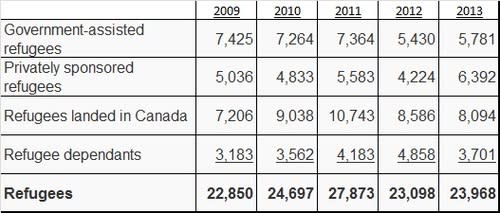 Canada Politics
Canada PoliticsNew Harper government measure could restrict social assistance for asylum seekers

Human rights and refugee advocates in Canada are gearing up for another battle with the Harper government.
This time they’re angry at the Tories’ attempts to deny social assistance for refugee claimants.
Currently — under federal transfer payment regulations — provinces are not allowed to impose residency requirements for their welfare programs.
Last week, the House was scheduled to debate Bill C-585, Tory MP Corneliu Chisu’s private member bill that, if passed, would amend those rules and allow provinces to bar asylum seekers from receiving benefits such as housing or other support services.
Now, according to the Canadian Press, text of Chisu’s bill has effectively found it’s way into the Tories’ omnibus budget bill, introduced in the House of Commons on Thursday.
Barring any major surprises — the bill will become law before Christmas.
[ Related: Should Canada accept more refugees? ]
Even before the Tories’ decision to include Chisu’s bill in their omnibus budget bill, opponents of the government were pleading for public support against the measure.
There was this petition:
"Fleeing persecution places tremendous stress and burden on families seeking refugee status in Canada. Some of these families suffer from post traumatic stress disorder that can make finding and holding a job difficult without appropriate health care. Work permits take time to be approved and issued, which often leaves people with no source of income for months on end. In the interim, access to social assistance is vital to sustain and rebuild lives. Without that source of support, many will be unable to feed, house, or clothe themselves and their families, putting further pressure on already overburdened charities and shelters."
And, last week, Amnesty International, released a statement suggesting that denying social assistance to refugee claimants violates international law.
"The right to social security is fundamental and inextricably linked to the right to life and the ability of an individual to realize his or her other basic needs such as food, water, shelter, and health," Elizabeth Berton-Hunter, a spokesperson for Amnesty International told Yahoo Canada News on Friday.
"Its availability should be based on need and not on immigration status in an arbitrary and discriminatory way. We should be weary of accepting a law based on an unfounded assumption that individuals who have fled atrocities in their home country have sought protection in Canada in order to abuse its welfare system.
"On the contrary, The UNHCR has noted on several occasions the positive contributions, including economic benefits, refugees and refugee claimants make to their asylum countries when they are allowed to integrate locally."
As for the Tories, they claim they’re just looking after the taxpayer.
“Canada has the most fair and generous immigration system in the world,” Kevin Menard, a spokesperson for Immigration Minster Chris Alexander, told Yahoo Canada News in an email.
"However, Canadians have no tolerance for those who abuse our generosity and who take unfair advantage of our generosity. We will give the power to the provinces and territories to establish minimum periods of residence to qualify for social assistance, if they wish to do so.
"This would build on the savings already being seen through recent reforms to Canada’s asylum system which will result in total savings to taxpayers of $1.6 billion over five years.”
Since 2011, the Harper government has made significant changes to the refugee act, speeding up processing times and placing restrictions on claimants from countries unlikely to produce legitimate refugees. Asylum seekers from countries designated as “safe” — countries that generally do not produce refugees, which respect human rights and offer state protections — are now processed (and often rejected) on an accelerated basis.
The Tories also restricted claimants’ health benefits leaving some refugees with only “urgent health care” and others with care only if they have a disease that would be a risk to the public.
While refugee advocates continue to call the measures unfair, the government justified the changes by citing reports about applicants — primarily from Hungary and Mexico — who came to Canada solely for the purpose of “exploiting” social assistance and health benefits.
In 2012, then-immigration minister Jason Kenney touted statistics, obtained by Postmedia News, which stated that between Jan. 17 and Dec. 31, 2011, “8,819 Mexicans racked up nearly $7 million in health care costs under the Interim Federal Health Program.”
To add insult to injury, 5,068 refugee applications from Mexico were either rejected, withdrawn or abandoned in 2011.
[ Related: Declining refugee numbers prove Tories save money on backs of vulnerable people: NDP ]
But critics argue that the changes are cruel and have marred Canada’s reputation internationally.
"Canada has over the decades had a very positive reputation in the international community when it comes to refugee protection," Berton-Hunter said.
"However, changes to its laws and policies to make its immigration and refugee system more restrictive over the last five years, for example, by making drastic cuts to its Interim Federal Health Program, is putting that image in jeopardy."
Refugees to Canada, by category:

Source: Citizenship and Immigration Canada
(Photo courtesy of Citizenship and Immigration Canada)
Are you a politics junkie?
Follow @politicalpoints on Twitter!


